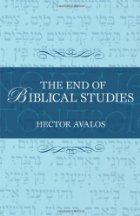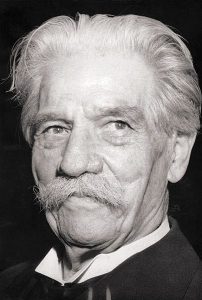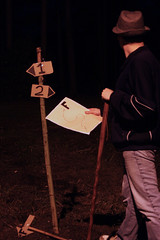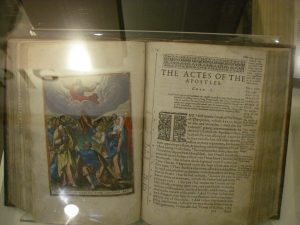When discussing the evidence for the historical Jesus in Honest to Jesus Robert Funk writes
What do we know about this shadowy figure who is depicted in snapshots in more than twenty gospels and gospel fragments that have survived from antiquity?
The short answer is that we don’t know a great deal. But there are a few assorted facts to which most critical scholars subscribe. (p. 32)
A layman introducing himself to this topic for the first time would be forgiven for understanding this passage as assuring him that “critical scholars” have been able to construct at least some meagre outline of an historical figure drawn from careful analyses of more than twenty independent pieces of evidence. Ironically Funk elsewhere complains that “biblical scholars . . . have learned to live in a limbo between the heaven of the knowledge we possess and the hell of the ignorance we have taken oaths to dispel . . . by cultivating ambiguity . . .” (pp. 54-55)
So it will be informative and in the interests of being honest to historical enquiry to take careful note of exactly what are these “assorted facts” about Jesus that Robert Funk lists, and their actual sources. It will also be instructive to compare the reasons for accepting some data as “facts” with those used for rejecting others as “fictional embellishments”.
Common misunderstandings of the mythicist argument
1. Before continuing, just to clear aside one common misperception raised any time the mythicist argument enters:
No one I know of has ever argued (and I certainly don’t) that someone made up a story about recent real historical events and invented persons, and that significant numbers of people (who could have known better) began to believe in this newly constructed history of the recent past.
As far as I know that is not how any new religion or myth emerges. The narratives usually evolve as post hoc explanations of rituals and beliefs. Historicization is often a relatively late phase. Compare the trajectory of evidence we have for Jesus: the earliest sources (Paul’s letters, let’s say, and his earlier sources such as creedal formulas and prayers) portray a divine Christ figure, and there is a gradual ‘humanization’ of this figure through to the relatively late gospel of Luke, and even more so with some of the later apocryphal gospels. Some scholars, significantly, read Mark, the first of the canonical gospels, as an intentional allegory or parable, not history. Some, also significantly, question the common early dating of the gospels. (I hate to disagree with certain assumptions underlying James Crossley’s public version of his doctoral thesis on this, but so be it.)
2. A second argument commonly thought to dispense with the mythicist position up front is that it is said no Jew would make up the idea of a crucified Messiah, hence there must be a historical basis for the belief that Jesus was the Messiah and that some remarkable experience must have enabled them to continue with this belief after his death. This is nothing less than the fallacy of the argument from personal incredulity. In response it should be enough to point out
(a) the logical fallacy and
(b) a work of the Jewish scholar, Jon D. Levenson, The Death and Resurrection of the Beloved Son.
I have made available the general outline of his arguments in a series of posts here. One of my most accessed posts is from this archive, and titled, Jesus Displaces Isaac: midrashic creation of the biblical Jesus (6). Levenson provides the evidence and reasons for believing that the Christian narrative of the atoning and saving death and resurrection of the Beloved (Only) Son was borrowed from late Second Temple Jewish midrashic interpretations of their scriptures about Isaac, Joseph and others. While the cosmic significance of this event is attributed to Jewish apocalyptic, the story itself is a natural evolution or mutation of a Jewish idea that had been on the burner for some time. It is not a huge leap to merge known Jewish precedents relating to Isaac with Son of Man concepts from Daniel in the post-70 trauma of the Jews.
This synopsis of a caveat is still an oversimplification. A full explanation has been made many times elsewhere and I can reserve my own take for another post.
Funk’s list of assorted facts and figures
The words in parentheses are Funk’s own qualifications. Bold font indicates “facts” listed without qualification.
- Jesus lived from around and between the death of Herod the Great to the end of Pilate’s governorship
- Jesus lived in Palestine
- Jesus “was attracted to” the “movement” of John the Baptist (“fairly certain” of this)
- John the Baptist was a historical figure (“almost certain” of this)
- Simon Peter, James and John, sons of Zebedee and known as “thunder brothers” were followers of Jesus (we “know” this)
- Jesus is “linked” to the reign of King Herod by being “allegedly” born at this time
- Herod Antipas ruled Galilee during the lifetime of Jesus
- We have the name of Pontius Pilate under whom Jesus was crucified
- Mary Magdala was one of a few women associates of Jesus
Beyond these few shadowy faces, we have very little hard information. Nevertheless, there is substantial evidence that a person by the name of Jesus once existed. (Funk, p. 33)
“Substantial evidence”? I submit that each one of the above “assorted facts” is taken ultimately from one of the theological narratives of the canonical gospels. This is nothing more than a presumption that some bare bones of the gospel narratives can be considered historical fact. We are given no reason for thinking why any of this narrative should be thought anything more than fictional.
I submit that the “substantial evidence”, if this is it, is a faith-based presumption about the nature of the canonical gospels.
It is not of the same order as “Caesar crossed the Rubicon”. Real historical facts derive from sources deemed trustworthy as conveying, shaded in varying hues, something historical in nature. Such sources are coins, public monuments, biographies, personal letters and histories.
Funk continues:
Some additional isolated facts can be gleaned from the surviving records. These are data that a disinterested, neutral observer could have attested.
“Surviving records”? Funk makes theological narratives full of the miraculous and midrashic retellings of older biblical stories sound like births and deaths registers or police records of interviews.
Recall “cultivating ambiguity”. . .
But the logical fallacy lies in the second sentence. This is just another way of saying that the details are backdrop and setting — the time of Herod, Pilate, the setting of Palestine — to the narrative. Funk implies that knowing the names of certain characters is itself significant. But he dismisses the details of personal names later (p. 235) in his book for being nothing more than “fictional embellishments” to create a sense of verisimilitude. (I quote his argument below.)
Adam had a wife and sons, and we know their names, Noah had sons, Moses had followers, even God and Zeus have followers in the literature. The fact of followers in a literary narrative, and names assigned to them, may well be the sorts of details a neutral observer could attest if they were historical facts. But to assume that this estalishes that the details are historical is begging the question. It is circular reasoning.
The critical methods used by “critical scholars” are not used consistently. This surely indicates that there is something else that is needed to maintain the justification for their scholarly interest. Ironically Funk himself hits the nail on the head in a savage critique of biblical scholarship (pp. 54-56) but fails to see in this instance his own failings.
- Jesus lived in Galilee — a place of “mixed bloods” and hence despised by the “ethnically pure” southern Judeans
- Jesus lived in Nazareth
- Jesus “was probably” born in Nazareth
- Jesus was a Jew
- Jesus’ father was a carpenter or craftsman of some kind (“may have been”)
- Jesus was a carpenter or craftsman of some kind (“may have been”)
- Jesus’ mother was Mary
- Jesus had four brothers, named James, Joses, Judas, Simon
- Jesus’ mother and brothers were initially sceptical of Jesus but later became Christians (“according to Mark”)
- Jesus had sisters (“may have had them”)
These details square with what we know of the period and place, and scholars see no reason why the Jesus’ movement would have invented them. (p. 33)
Scholars can see no reason why the Jesus movement would have invented details like Nazareth being his hometown, like appearing in Galilee, like having a family? Then they have missed Matthew’s gospel giving readers very good theological reasons for making up some of these things.
Matthew finds a Nazareth home for Jesus a convenient explanation for Jesus being known as a “Nazarene”. (This epithet may have related to an early sect for whom the term meant something like “observer” or “keeper”.)
The same Matthew also finds Galilee as a perfect setting for enabling Jesus to fulfil the prophecy of Isaiah 9:1-2 — Matt. 4:13-16.
Mark earlier found a theological function for giving Jesus a family. To have a family who rejected him set Jesus in the wake of the likes of Joseph and Jephthah and David, the persecuted saints of old. As for the names of the brothers? Well, Funk fully endorses the argument for fictional verisimilitude being the reason for the appearance of the names Alexander and Rufus as sons of Simon who carried the cross of Jesus. On page 235 in relation to these and other gospel names Funk writes (with my emphasis):
The assignment of names and the particularization of place enhance verisimilitude in fiction. Sherlock Holmes and Dr. Watson are taken by millions to have had real existence, and 221B Baker Street is an actual address in London that tourists can go and see for themselves. Robin Hood and the Sheriff of Nottingham exist for many as certainly as do King Arthur, Guinevere, and Lancelot.
If “critical scholars” can reject the historicity of the likes of blind Bartimaeus, Jairus the synogogue official, Barabbas, Simon of Cyrene and Alexander and Rufus on grounds of theological interest or fictional verisimilitude, then consistency would require them to do the same for both the fact and names of Jesus’ family, and the Nazareth and Galilee “particularizations of place”. — At least they need to address the theological interests clearly visible as their underlays.
- Jesus spoke in Aramaic (“suggested by Matthew’s account of the confrontation with Peter in the courtyard during Jesus’ trial”)
- Greek “was probably” his second language (“now evidence suggests he may have been bilingual”)
- Jesus was active in the towns and hamlets of Galilee
The critical reader must be constantly alert to fictional embellishments of the gospels (p. 34)
This statement implies the gospels originated as a dead straight factual historical or official report of Jesus that somewhere along the line some scribes were tempted to colour with a bit of a stretch here and there. He makes this remark in direct reference to stories sometimes used as evidence that Jesus was literate, such as his writing in the dirt at the Woman Caught in Adultery scene.
The statement is nothing more than a truism. It smokescreens the fact that the source of evidence is derived from documents whose provenance is unknown, and whose theological interests and fictional embellishments are all too obvious. I cannot imagine historians in other (nonbiblical) fields relying so heavily for “evidence” on documents of unknown provenance.
- Jesus was baptized by John (“highly probable”)
- Jesus left John to launch his own career (“relatively certain”)
These events are not likely to have been invented by Christian apologists. (p.33)
Why not? We once again encounter the fallacy of the argument from incredulity, referred to above.
Scholars well know that Mark’s view of the nature of Jesus is not quite “orthodox”. The “adoptionist” character of his opening baptism scene is widely commented on. I can see no reason for such a Christian apologist, particularly one of an adoptionist persuasion, being embarrassed about manufacturing a baptism scene for Jesus. The Spirit of God that made Jesus the Son of God is said to have entered Jesus after his baptism. Besides, any story of Jesus had to begin with a prior announcement by Elijah, as per the Malachi prophecy. To fulfil prophecy a story of a coming deity had to begin with an introduction by a lesser mortal or angelic figure.
The Iliad opens with the greater hero, Achilles, half man and half divine, being over-ruled and humiliated publicly by a mortal and character-flawed king, Agamemnon. Such a scene is “not likely to have been invented by Homeric apologists”? Ah yes, but that is how the plot gets going. Well, the same with the gospels. It is the baptism of Jesus that is at the end of the gospel brought in as testimony to his authority. The event is recalled repeatedly each time Elijah makes an appearance, and the career of John is a foil for that of Jesus. The baptism itself, given its Pauline meaning, is a metaphor for death and resurrection, and with the crucifixion and resurrection forms a neat bookend set for the gospel.
And in Mark it appears only the “man” Jesus is baptized, while the Son or Spirit of God enters him after his baptism.
If all this is the correct way to read Mark, then we would expect later more “orthodox” gospel authors to be embarrassed by the account and to downplay it. And that is exactly what we do find. Matthew has John apologize for baptizing Jesus, Luke sidesteps the scene, and John leaves no place for a baptism at all.
- Jesus was an itinerant sage, teaching and healing and living on handouts
- Jesus practiced exorcism
- Followers gathered around Jesus
- Jesus was popular
- Jesus was opposed by some religious authorities (“although much of the controversy . . . may reflect later conditions”)
- Jesus’ public career lasted one to three years (“implied” in the gospels)
- Jesus went to Jerusalem, offended the authorities and was executed by the Romans
- We have a compendium of Jesus’ teachings
So say the gospel narratives. All of Funk’s supporting footnotes in this section of Honest to Jesus direct the reader to Mark, Matthew and Luke.
I’m well aware of the tool of source criticism to attempt to get behind the gospel narratives. The answers that this tool delivers may enable us to glean prior sources, but that is not the same as establishing the provenance of those sources, let alone their historicity.
It seems to me that the base criterion used for “establishing bedrock historicity” is deciding what the plot or characterization cannot do without and still survive as a basic plot or characterization. If so, that is not establishing historicity. It is only establishing plot and character essentials in a tale that has a lot more in common with those of Elijah and Moses than those with Caesar and Alexander.
Like this:
Like Loading...
 To argue for a nonhistorical Jesus has been ignorantly compared with arguing “Creation Science” (“Intelligent Design”).
To argue for a nonhistorical Jesus has been ignorantly compared with arguing “Creation Science” (“Intelligent Design”).




